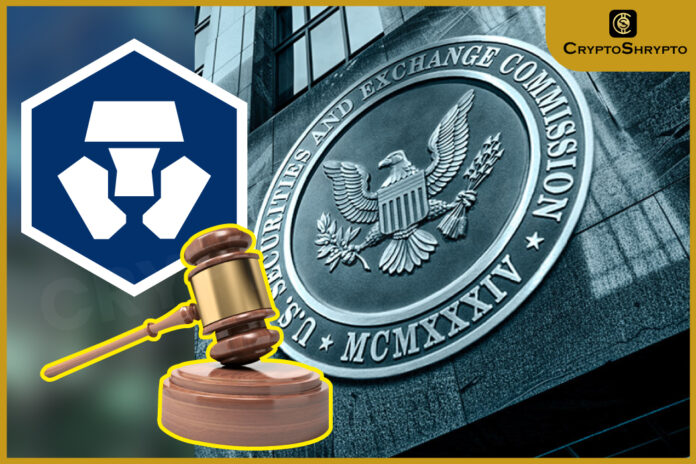Crypto trading platform Crypto.com has filed a lawsuit against the U.S. Securities and Exchange Commission (SEC), claiming the agency is overstepping its legal authority by attempting to regulate the cryptocurrency industry. The lawsuit was triggered after the SEC issued a Wells notice to the company, stating that several tokens traded on Crypto.com’s platform are classified as securities under U.S. law, which could lead to enforcement action.
The lawsuit pits Crypto.com, a major global cryptocurrency exchange, against the SEC, the principal U.S. regulator for securities markets. This legal challenge is part of a broader resistance from the digital asset sector, which has increasingly found itself at odds with the SEC’s regulatory stance.
The legal action was initiated on Tuesday following the receipt of the Wells notice from the SEC. A Wells notice serves as a formal warning from the regulator that an enforcement action may be imminent. Several other companies in the digital assets space, such as Coinbase, Robinhood’s crypto arm, and the NFT marketplace OpenSea, have also received similar notices this year.
The lawsuit was filed in the United States, where regulatory uncertainty has led to numerous clashes between the SEC and crypto firms. As a result, the U.S. has become a battleground for legal interpretations of how digital assets should be classified and regulated.
Crypto.com argues that the SEC has expanded its jurisdiction beyond statutory limits by labeling almost all crypto assets as securities without proper legislative backing. The company claims that the SEC is effectively making new rules for the crypto industry through enforcement actions rather than by clear regulatory guidance or Congressional authorization. This, according to Crypto.com, is leading to confusion and stifling innovation within the digital assets sector.
In its lawsuit, Crypto.com seeks to restrict the SEC’s ability to unilaterally declare most digital tokens as securities and enforce compliance on crypto firms. This challenge follows a broader industry push for clearer regulations and more defined boundaries for oversight, which the SEC has been criticized for lacking. The outcome of this legal confrontation could set a significant precedent for the treatment of cryptocurrencies under U.S. law and reshape the regulatory landscape for digital assets. The case underscores growing industry frustration with the SEC’s approach and the need for comprehensive crypto regulations.




